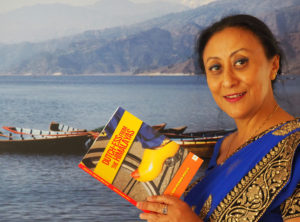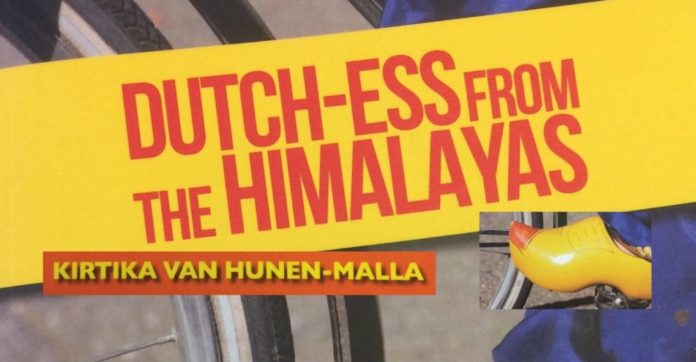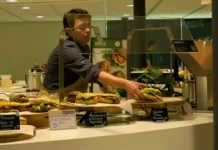‘Feeling happily at home between cultures while keeping your cultural identity intact, is possible to achieve’ says Kirtika Van Hunen. She is the author of the best-selling book ‘The Dutch-ess from the Himalayas’. Read on to find out about the behind the scenes of this book, what makes Kirtika a unique intercultural trainer and her upcoming projects.
After having enjoyed ‘Dutch-ess from the Himalayas’, a straight-from-the-heart account Kirtika’s experience of the Dutch culture, I was in pleasant anticipation of this meeting with the author. I wondered what could have inspired Kirtika to write this book? What is it that drives her to help people feel ‘happily at home’ between two cultures?
What shone out through this delightful interlude, was the passion that Kirtika exudes. It was evident that she has adapted the best of all cultures she has been exposed to and found a happy medium for herself. That positive outlook was infectious and I caught myself smiling through the chat. If this is what living between cultures does to someone, then it is something we should learn from Kirtika. I cannot wait for her new book (When Cultures Meet) to be out later this year. Eindhoven News wishes Kirtika the very best in all her endeavours.
Q: Born in Nepal, educated in India, working and living in the Netherlands – you aptly describe yourself as ‘The Dutch-ess from the Himalayas’. Can you tell our expat readers a little bit more about yourself?
Kirtika: (Laughing) People always ask me where I come from and I say that I identify myself as a world citizen. I was born in Nepal, was brought up in a convent in India run by Irish nuns and have now been in the Netherlands for more than 25 years. In these years, I have travelled extensively and worked in diverse environments both in the East and the West. I speak six languages (learning a seventh currently). That is how I call myself a true world citizen and one who has a passion for people and diversity.
Q: We can imagine how you are a natural ‘Cultural Connoisseur’. How did the transformation happen from a career in sustainability to starting your own cultural consulting?
Kirtika: Yes, indeed! I am a Post Graduate in Forestry and used to work in Nepal with the Internationals for the Government. I have a Masters in Environment Management from the University of Hertfordshire, UK. I worked with the Government of the Netherlands for 17 years; making policies around sustainability. I wanted to work more closely with people and help them directly. Around that time, I also had a very negative personal experience that made me decide that I do not want to sit back as a victim. I felt that I would rather help others in similar situations. I needed some real learning in the area to combine with my own personal experience. So I followed a course in Crossing-Cultures with Competence from Washington DC. Those feeling lost between cultures need not re-invent the wheel. I combine the certified techniques with my personal experiences of 25+ years.
Q: Tell us the story behind your book ‘Dutch-ess from the Himalayas’.
Kirtika: (Smiling reminiscently). As I was saying, I was looking for ways I could help other people. I thought that if I write my own story and make it authentic with actual experiences, it could inspire others in a similar situation. People could be moving countries for various reasons like work, family or even because of war and unrest. There could be some situations in the book that others working and living between cultures will also go through. Written in a positive way, these experiences could inspire them to find their space in the Netherlands too. I have tried to be very transparent and to keep the book fun to read. There is no compulsion to read the book from cover to cover. All in all, it took me about six months to write the book and it was probably easy because it is about my own experiences.

Q: In your book, you have written about how you have experienced that employers in the Netherlands may have a preference for a ‘younger’ job seeker. In your opinion, is that trend changing?
Kirtika: When I wrote the book in 2016, it was a very trending issue. The situation is true to an extent even now. Younger employees are seen to be cheaper, better and innovative with the newer technologies. At that point in time, a lot of people who felt left out decided to be freelancers or start something on their own. In fact, at this moment, there are over a million people in the Netherlands having their own one-person entrepreneurship. Organisations should realise that an older person brings more experience and know-how. Younger employees should be given the chance to build on their experience. Neither needs it to be true that the more experienced have to be very expensive all the time. What is important for organisations is to ensure that they do not let the knowledge go to the grave. As with the wise Chinese teachers, there should be a transfer of this valuable learning to the next generation and for that, the organisation needs to have the right balance of the young and old employees.
Q: How have you been keeping yourself busy during the pandemic? Any new projects?
Kirtika: I started on my new book before the pandemic. It took some time as it is bilingual – it is almost like writing two books at the same time. I wrote each chapter in English first and then translated it to Dutch myself. The Dutch book is ready and it is called ‘Waneer Culturen Elkaar Ontmoeten’. It should hit the book stores in November this year. In English, it is called ‘When Cultures Meet’. The idea of the book is to empower the readers to work successfully between cultures and so goes beyond the Dutch culture. It is especially handy for organisations doing business with other countries, looking to negotiate and for teachers working with internationalization or international students. The book draws on my last 25 years of work/interviews with multiple cultures and age groups and I have used these stories as anecdotes. It is very important to understand the Why of other cultures to work successfully with other cultures.
During the pandemic, I have made my cultural training (the Dutch version) online and I am working on doing the same with the English one. The very first is titled ‘Working with the Dutch’ and is a ready reckoner for expats and internationals. A lot of creative thought has been put in to make it interactive. I supplement these with in-person or skype workshops. I do a pre-intake to understand what the organization or individual wants and make workshops tailored for their exact needs.
Q: In the book, you have used your real-life experiences to compare the cultural habits of your homeland vs the Netherlands. Now that you are a long-timer in the Netherlands, what is it that you miss most from your homeland?
Kirtika: Let us be fair that all cultures have positives and negatives. No one culture has it all perfect. To an extent, I miss the ‘WE’ culture from back home. The definition of a family there is very different from the nuclear family in the Western world. I miss having that big family, impromptu conversations and get-togethers. There, they just drop in if they happen to be in the neighbourhood. Here, you might have very good friends, but you still have to make an appointment to meet them or have a meal with them. It is very supportive on the one hand to have that ‘WE’ culture. At the very extreme, it can lead to a lot of advice from the elders and being pushed to do things that you might not want to do.
Q: And if you were to take something from the Dutch culture back to the one you grew up in, what would that be?
Kirtika: (Laughing out loud) Being clear cut about what I mean. Not winding around so that one has to really sit and think for a few days to understand what someone actually meant. We do not have to be rude but it is better to be crystal clear about your meaning. It is so much easier if you can understand what the other person is trying to say.
Q: Is it rice and curry or stamppot for dinner at chez Kirtika Van Hunen?
Kirtika: I like to try all cuisines. My cultural cooking is slow cooking and so that is usually reserved for the weekends. Today, it is Mexican at our home 🙂
Q: Any special messages for the Eindhoven News readers?
Kirtika: What I have realised is that many of us have been taught to count ourselves last and treat others first; maybe as a sign of modesty. But my personal experience and working with multi-culturals has taught me that this is not necessarily right. Asking for help is not a weakness, but a strength. When you land in a new country, be prepared for a culture shock. Even if you have read about the Netherlands before moving, the reality could be very different. If you have a dream and there are opportunities in the Netherlands, go ahead and grab it. Make it a priority to invest in yourself and if needed, take help from experts. It is not egoistic to think about yourselves. Ultimately, if you are happy and healthy, then only you can spread happiness. So take care of yourselves as nobody else can or will do it for you.
You can also read more about Kirtika’s program ‘Between two cultures’ which empowers people to grow in multicultural societies.
For Eindhoven News, Muktha Kartik Iyer
 Muktha is a Process Consultant by profession and is passionate about books, languages and animals. She is working on her dream of publishing a rack full of books of her own.
Muktha is a Process Consultant by profession and is passionate about books, languages and animals. She is working on her dream of publishing a rack full of books of her own.
















